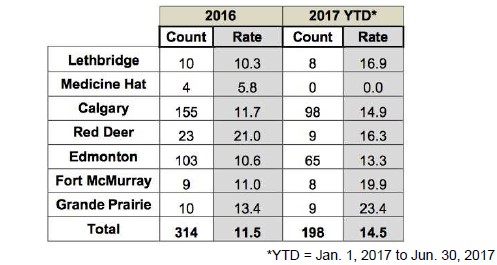Provincial/Municipal Working Group on Opioids
IT IS THEREFORE BE RESOLVED THAT the Alberta Urban Municipalities Association request the Government of Alberta to establish a Provincial/Municipal Working Group on Opioids to directly engage municipalities in addressing the opioid crisis.
WHEREAS Alberta had 368 deaths associated with fentanyl overdose in 365 days in 20161 (1.01 per day);
WHEREAS from January 1 to June 30, 2017, the rate of fentanyl overdose related deaths has increased by 29% to 1.3 per day across the province1;
WHEREAS in Alberta, over the past five years, the number of emergency department visits increased almost ten-fold for heroin poisonings and more than ten-fold for synthetic opioid poisonings (including those related to fentanyl)2;
WHEREAS the Municipal Government Act in part describes the purpose of a municipality to be to “develop and maintain safe and viable communities”;
WHEREAS municipal resources including first responders, Family and Community Support Services (FCSS) departments, enforcement agencies, housing bodies and public education programs are already impacted by, or working directly with, individuals and groups facing the opioid crisis;
WHEREAS municipalities maintain close connections to localized non-government organizations working in areas such as harm reduction, housing, health, public education and serving vulnerable populations;
WHEREAS notwithstanding ongoing provincial efforts to address the opioid crisis such as the establishment of the Opioid Emergency Response Commission, to date no specific steps have been taken to directly engage municipalities as partners in addressing the crisis; and
WHEREAS municipalities have resources and knowledge that could be called upon to develop and execute interventions that are more comprehensive, direct and appropriate to local context.
Alberta had 368 deaths in 2016 associated with fentanyl overdoses. Across Canada, the opioid overdose crisis has been driven by the emergence of fentanyl and other powerful illicit drugs, as well as by inappropriate prescribing practices and poor education about the risks associated with opioids.
In May 2017, the provincial government established a Minister’s Opioid Emergency Response Commission1, under the Opioid Emergency Response Regulation in the Public Health Act. The commission will oversee and implement urgent coordinated actions on the opioid crisis, focused on six strategic areas:
- Harm-reduction initiatives
- Treatment
- Prevention
- Enforcement and supply control
- Collaboration
- Surveillance and analytics
The members of the Minister’s Commission are:
- Dr. Karen Grimsrud, Chief Medical Officer of Health for Alberta (co-chair)
- Elaine Hyshka, assistant professor at the University of Alberta’s School of Public Health (co-chair)
- Karen Turner, president of Alberta Addicts Who Educate and Advocate Responsibly (AAWEAR)
- Marliss Taylor, program manager of Streetworks, Edmonton’s needle-distribution program
- Dr. Esther Tailfeathers, physician on Kainai First Nation (Blood Tribe)
- Petra Schulz, parent advocate with Moms Stop the Harm
- Atiya Ashna, Diversity and Community Collaboration specialist
- Staff Sgt. Jason Walker, Calgary Police Service
- Dr. Nicholas Etches, Calgary clinician with expertise in opioid addiction and treatment
- Dr. Karen Mazurek, deputy registrar, College of Physicians and Surgeons
- Kathy Ness, Assistant Deputy Minister, Health Services Delivery Division, Alberta Health
- Bill Sweeney, Senior Assistant Deputy Minister, Public Security Division, Alberta Justice and Solicitor General
- Kathryn Todd, Vice President, Research, Innovation and Analytics, as well as Executive Lead for Seniors, Addiction and Mental Health with Alberta Health Services
- Dr. Gerry Predy, Senior Medical Officer of Health, Alberta Health Services
While not exclusively contained to larger urban municipalities, as the following table3 shows, a number of cities are being significantly impacted by fentanyl related overdoses and deaths.
Rate (per 100,000 person years) and number of deaths due to an apparent drug overdose related to fentanyl, by place of death and city. Jan. 1, 2016 to Jun. 30, 2017:

SOURCES:
- Alberta's opioid crisis response. (n.d.). Retrieved September 14, 2017, from https://www.alberta.ca/albertas-opioid-crisis-response.aspx
- Canadian Institute for Health Information. Opioid-Related Harms in Canada. Ottawa, ON: CIHI; 2017.
- Government of Alberta, Alberta Health. (2017, August 16). Opioids and Substances of Misuse Alberta Report, 2017 Q2. Retrieved September 14, 2017, from https://open.alberta.ca/dataset/1cfed7da-2690-42e7-97e9-da175d36f3d5/resource/5b2cbe3f-ea27-4688-bdded630ee770ba0/download/Opioids-Substances-Misuse-Report-2017-Q2.pdf
The Minister’s response to the 2017 resolution reiterates that municipalities “have resources and knowledge that can support Alberta's response activities. Alberta Health is interested in exploring options for sharing information with municipal leaders about Alberta's opioid response strategy as well as engaging municipalities regarding how they can increase their participation in the response to the opioid crisis.”
In May 2018, the province announced that the Opioid Emergency Response Commission’s term had been extended 18 months, and that new members has been appointed to the Commission. Bill Given, Mayor of City of Grande Prairie and AUMA Director for Cities up to 500,000 was among these new members. With a municipal representative on the Commission, the AUMA Board approved accepting the province’s response to the resolution, as establishing a separate Provincial/Municipal Working Group on Opioids would have been duplicating efforts.